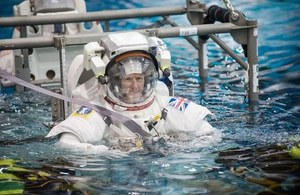Does human space flight influence the uptake of STEM subjects?
UK Space Agency funds new research project.

UK ESA astronaut Tim Peake on a spacewalk training session. Credit: NASA/Robert Markowitz.
Science Education researchers at University of York are to work with leading space scientist and The Sky at Night presenter Dr Maggie Aderin-Pocock MBE to investigate if human spaceflight inspires school students to study science, technology, engineering and maths (STEM) subjects.
The £348,000 three-year project, funded by the UK Space Agency and the Economic and Social Research Council (ESRC), will focus on British astronaut Tim Peake’s mission to the International Space Station (ISS), to be launched at the end of November 2015.
Tim Peake is the first British member of the European Space Agency’s astronaut corps, and he will become the first Briton to visit the ISS. As well as delivering invaluable scientific research and cutting edge technology, it is hoped that the programme will boost participation and interest in STEM subjects among school children.
The research will involve gathering views from pupils and teachers from a sample of 30 primary and 30 secondary schools. In addition, perspectives will be gained from space scientists on areas of the industry that may influence students. Participants will be asked their advice on space science resources for use with school students, leading to the production of an overview of space science resources. The study, starting in January 2015, will also involve the design of a new instrument to assess school students’ attitudes to STEM subjects and to space science.
Principal Investigator Professor Judith Bennett, from the Department of Education, University of York, said:
There is anecdotal evidence to suggest that space and space travel increase the interest of young people in science, technology, engineering and maths (STEM) subjects. We have a golden opportunity to gauge this hypothesis as we prepare to send a British astronaut into space at the end of next year.
Dr Maggie Aderin-Pocock added:
It is important that we help students to see the correlation between what they are studying in the classroom and what people do outside as scientists. The University of York’s study will help to find out more about what inspires young people to participate in and gain a life-long passion in STEM subjects.
Dr David Parker, Chief Executive of the UK Space Agency said:
the UK Space Agency is committed to supporting UK space activities. This research will allow us to better understand the ways in which our programmes affect society. The excitement of space gives an excellent context for STEM education, and we’re keen to make sure that the benefits of space – for education, for society, for growth – are properly assessed and understood.
Co-Investigators on the project are Dr Jeremy Airey and Dr Lynda Dunlop from the Department of Education, University of York.